Ålands yrkesgymnasium
Country: FI
Partner budget: 217.106 EUR
Amount of ERDF funding: 162.830 EUR ERDF

P4 Skilled and socially inclusive region
4.2. More aligned vocational education and training (VET) programmes in the Central Baltic region
Central Baltic
01.04.2020 - 31.12.2022
325.726 EUR
255.157 EUR ERDF
In the Central Baltic islands, the tourism season is short. To maximize their profit possibilities local business owners in the field of gastronomy and tourism need further training, but because they own microbusinesses or SME:s they have no possibilities to undertake full time studies.
The project EPIG aims at supporting them to boost their skills in a flexible way. By developing a curriculum in collaboration with vocational schools in the Åland islands and Saaremaa and by taking into consideration the islands peculiarities. The 10 ECTS curriculum will be developed tested and evaluated on/by students. Based on the first evaluation the curriculum will be improved and tested again.
As a result, the developed curriculum will be implemented in the partners’ vocational schools.
Country: FI
Partner budget: 217.106 EUR
Amount of ERDF funding: 162.830 EUR ERDF
Country: EE
Partner budget: 108.620 EUR
Amount of ERDF funding: 92.327 EUR ERDF
Country: SE
The main result of the project is a joint curriculum for Gastro Tourism (10 ECTS) which implementation is supported by a teachers’ manual and further trained teachers. During the combined activities, especially the workshops for the teachers, both the curriculum and the teacher manual were extensively discussed. Also students were involved in developing and improving the curriculum.
One of the outcomes of the project was that the lack of skills and the needs of skill enhancement in the gastronomy and tourism industry were analysed using a survey. Presenting the results of the survey motivated teachers and other stakeholders to take part in the project and to see a need to actively participate in the development of a new curriculum. The bottom-up approach which allowed all teachers to contribute to the development of the curriculum was highly estimated. It encouraged greater commitment from project participants and better relationships between colleagues because everyone was given the opportunity to influence decisions, regardless of their position.
Project has indicated in their final report that the biggest value of the cross-border cooperation was that the participants learned from and about each other as well as about successful factors influencing the Gastro Tourism Industry in both countries. In addition, the cooperation project provided inspiration, improved language skills and cultural exchange among teachers and students.
Project information, Lead Partner website Åland
Project information, Estonian partner
Gastronomisk turism ska lyfta den åländska restaurangnäringen (Radio 2020)
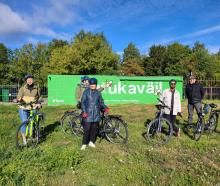
P2 Sustainable use of common resources
2.3. Better urban planning in the Central Baltic region
Central Baltic
01.02.2020 - 31.12.2022
1.302.619 EUR
1.048.226 EUR ERDF
To address the climate change related challenges that cities increasingly face, B.Green aims at improving urban planning by developing a new green infrastructure (GI) planning concept into the pre-planning process of cities.
B.Green addresses two urban planning challenges: how to combine green and grey infrastructure in the context of urban mobility development and how to ensure that multifunctional GI is taken into account throughout the pre-planning phase. The project utilises recent research and combines it with local knowledge produced by residents and other local stakeholders during the project.
The project will focus on the twin cities of Helsinki and Tallinn, in which the co-created B.Green concept and GI solutions will be demonstrated. In the local pilots, both agile approaches as well as active citizen participation with the aid of digital tools, which are all important elements of the B.Green concept, are implemented. The implementation is done with wide stakeholder engagement, utilization of applied digital tools and encouraging capacity building in the BSR area. In building and testing the B.Green concept, advanced technologies such as simulation, VR, AR, geotracking and wifi-sniffers, are utilised, while also creating new business potential. These solutions improve the mutual learning and communication process between different stakeholders.
The project will have long term effects on both local level through pilots that are linked to large scale infrastructural development, as well as wide scale-up potential through the associated partner networks. B.Green is tightly connected to local and larger strategies, such as the cities carbon neutral objectives and the EUBSR strategy.
Country: FI
Partner budget: 590.000 EUR
Amount of ERDF funding: 442.500 EUR ERDF
Country: EE
Partner budget: 522.619 EUR
Amount of ERDF funding: 444.226 EUR ERDF
Country: EE
Partner budget: 190.000 EUR
Amount of ERDF funding: 161.500 EUR ERDF
Country: FI
Country: FI
Country: FI
Country: FI
The project B.Green implemented several successful green infrastructure concepts, plans and executions to improve early phase urban planning. All the actions were implemented in six selected pilot areas located both in Helsinki and Tallinn:
All plans were created in collaboration with several stakeholders – urban planners, local citizens, companies.
City of Tallinn planning to build 13.5-km green corridor for EUR 1.3 mln (The Baltic Times, 2020)
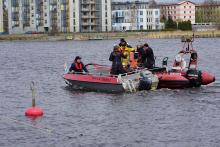
P3 Well-connected region
3.2. Improved services of existing small ports to improve local and regional mobility and contribute to tourism development
Southern Finland - Estonia
01.04.2020 - 31.03.2022
518.816 EUR
420.083 EUR ERDF
The increasing marine traffic and frequent technical problems with yachts and motorboats,as well as inadequate experience of boat owners, generate the need to establish a volunteer maritime rescue organization encompassing all Nordic countries.
The main objective of the project is to create the Trossi Service – a common maritime assistance service tool based on the experience of all Nordic countries and aimed at small boats. This service will provide primary technical assistance to amatorial boaters – small repairs on location, the possibility to tow in the nearest harbour, and information about available facilities for larger repairs as required.
The model will initially be established in 10 Estonian and Finnish small ports and implemented by regional coordination centres in which local voluntary maritime rescue organizations will offer the technical assistance service in cooperation with the port operators. IT experts will develop the information system necessary for collecting and maintaining the data needed for operating the service. The project will engage all interested parties – government agencies, local municipalities, ports, yacht clubs, boat owners, and public interested in maritime activities.
As a result, the cooperation between local small ports and maritime rescue organizations will be significantly increased. At the end of the project an international conference of maritime rescue and technical assistance will be organized to further disseminate the information about the new integrated service.
Country: EE
Partner budget: 309.704 EUR
Amount of ERDF funding: 263.248 EUR ERDF
Country: FI
Partner budget: 209.112 EUR
Amount of ERDF funding: 156.834 EUR ERDF
The main objective of the project was to raise the maritime safety in coastal areas and in small ports in Estonia and Finland by developing integrated maritime technical assistance service – Trossi Service. The idea of the Trossi Service is to provide free non-emergency maritime assistance for recreational boats in Estonian coastal waters in case of problems with the boat. Easier technical assistance will be provided on site and/or the vessel will be towed to the nearest port where repair assistance can be obtained. Advice will be provided on finding a vessel parking space and repair shop.
As a result of project the safety Trossi service certificate was created in Estonia and first 5 small Estonian ports were certified. The network of Trossi service was created between Estonian and Finnish ports and there is an aim to extend it across the Baltic Sea region.
Project improved conditions/rescue capacity/service level in 10 small ports which are Trossi coordination centres: Pärnu, Grand Holm Marina (in Haapsalu), Purtse, Hara (in Juminda) and Kaberneeme ports in Estonia, and Hanko, Kasnäs, Loviisa, Nauvo and Tammisaari in Finland.
Many other small ports in Estonia (there are about 200 small ports in Estonia) have shown up the interest to fulfill the Trossi requirements and to join the network to be in the same standard with other local and Finnish ports.
P1 Competitive economy
1.2. More entrepreneunial youth
Central Baltic
01.04.2020 - 30.09.2022
799.270 EUR
646.586 EUR ERDF
The project aims to help activating students with special educational needs (SEN-students) through STEM (science, technology, engineering and mathematics) based entrepreneurship. The project focuses on training SEN students in STEM-based entrepreneurship and to support and assist them in the business idea development process through counselling and mentoring.
The main activities are: (1) Training of SEN-students. Developing a curriculum and training materials for STEM-based entrepreneurship considering SEN-students specific needs. Training of teachers to deliver trainings as a team: both STEM and entrepreneurship teachers are involved simultaneously. Training of SEN students in STEM-based entrepreneurship, including the formation of joint cross-border STEM-based possible business ideas and (2) Establishing joint cross-border student companies. The project activities also include raising awareness about STEM-based entrepreneurial possibilities, especially in the SEN context through reaching out for a wide range of stakeholders and network development (3) influence a pro-entrepreneurial attitude in the society and among youngsters.
The main results of the project will be: (1) 5 new joint SEN-student companies in the areas of STEM established and operational; 7 business ideas implemented as “business simulations” (2) 20 mentors trained to provide guidance and counselling to student enterprises.
Country: EE
Partner budget: 240.042 EUR
Amount of ERDF funding: 202.835 EUR ERDF
Country: FI
Partner budget: 315.933 EUR
Amount of ERDF funding: 236.949 EUR ERDF
Country: LV
http://www.sustento.lv/?lang=lv
Partner budget: 203.871 EUR
Amount of ERDF funding: 173.290 EUR ERDF
Country: EE
Partner budget: 39.425 EUR
Amount of ERDF funding: 33.511 EUR ERDF
SENsationalSTEM project aimed at increasing entrepreneurial thinking among young people by having a specific focus on SEN (special education needs) students. The project developed and piloted a cross-border entrepreneurship programme for SEN student in the field of science, technology, engineering and mathematics (STEM). The project provided a possibility for SEN students from Finland, Estonia and Latvia to create international student teams and establish student companies which can serve as basis for future co-operation and businesses.
Totally 84 students from 15 schools from Finland, Estonia and Latvia participated in entrepreneurship pilot programme. These students created 13 business ideas. Due to covid 19 cross-border team building and bootcamps for students took place only in the very end of the project, but students were still able to work and present their joint business ideas during the events.
Development of own business ideas was a valuable experience for the participating SEN students. Student companies provided opportunities for social, cross-border/international communication and improvement of vocational skills in a business simulation environment. Students learned about their business strengths and their skills gaps. Participation in the project also provided opportunities for the development of employability skills which complement the vocational skills the participants learned during the course programme.
P2 Sustainable use of common resources
2.4. Reduced nutrients, hazardous substances and toxins inflow into the Baltic Sea
Central Baltic
01.02.2020 - 31.12.2022
1.626.163 EUR
1.316.485 EUR ERDF
The project objective is to develop and test new storm water treatment solutions that will effectively clean storm water, ensure management quality and monitor water quality in near real time, thus enabling operative response in emergency cases.
To achieve these results, the project will address issues related to the 1) cleaning of stormwater with equipment/facilities, 2) quality system management and 3) e-monitoring of hazardous substances and toxins.This will lead to the development of near real time water quality monitoring devices that will be tested and implemented. The data related to the operative response to emergency cases will be collected to improve their functioning and for scientific purposes. The criteria for Quality Management and a set of corrective modifications will be implemented in the test areas of the participating countries by building centralised stormwater treatment solutions in Estonia and Latvia, and two decentralised solutions in Finland.
The Project partners will test the following new technical solutions:- a centralised multi-stage storm water treatment & monitoring system in Viimsi, EE;- a centralised stormwater treatment unit equipped with real-time sensors for monitoring in Riga, LV;- a decentralised bioretention basin/cells with monitoring functionality in Lieto and Turku, FI. In all areas, the technical solution of storm water treatment will be accompanied with a water quality system management and monitoring in near real time thus enabling operative response in emergency cases. Municipalities and cities will be equipped with criteria, instructions and tools for ensuring the quality management of stormwater management structures during the project life cycle.
Country: EE
Partner budget: 476.933 EUR
Amount of ERDF funding: 400.624 EUR ERDF
Country: EE
Partner budget: 243.967 EUR
Amount of ERDF funding: 207.372 EUR ERDF
Country: LV
Partner budget: 295.421 EUR
Amount of ERDF funding: 251.108 EUR ERDF
Country: FI
Partner budget: 336.211 EUR
Amount of ERDF funding: 252.158 EUR ERDF
Country: SE
Partner budget: 273.631 EUR
Amount of ERDF funding: 205.224 EUR ERDF
Country: FI
Country: FI
As the main result, the pollution to the Baltic Sea from the stormwater systems has been reduced in four pilot sub catchments - Viimsi (EE), Riga (LV), Turku (FI) and Lieto (FI) by applying new solutions in integrated cleaning of stormwater, management quality and real-time monitoring of water quality parameters. All pilots remain in active use of the participating municipalities.
Additionally, the project demonstrated a fruitful way of cooperating between local governments and higher education institutions in innovation for improvement of the environmental condition of the Baltic Sea. The project offered an excellent opportunity to bring together the best specialists from the participating countries for joint implementation. The project results provided to develop guidelines for constructing the wetlands and establish permanent sampling/ online monitoring systems.
Lead partner webpage - project link
P4 Skilled and socially inclusive region
4.2. More aligned vocational education and training (VET) programmes in the Central Baltic region
Central Baltic
01.06.2020 - 31.12.2022
476.400 EUR
381.535 EUR ERDF
The aim of the FinLat-Logic project is to align parts of the work-based learning (WBL) curricula of VET programs in the field of logistics between Latvia and Finland. As a result, VET students enrolled in logistics programmes in Latvia and Finland will will follow a WBL curricula in logistics-related companies based on each other's country. Thus, it will be possible to align WBL programs via the employers of partecipating companies in both countries. The WBL will also be used as a tool for the alignment.
The project aim will be achieved through the following main steps:1) initial comparing of VET logistics and WBL programmes between the two countries; matching trainees and host companies;2) cross-border WBL of logistics students; monitoring of the workplace learning and feedbacks from logistics companies and trainees;3) finalizing alignment of WBL programs in logistics.
The results of the FinLat-Logic project will be: 1) Aligned parts of WBL programs in logistics between Finland and Latvia corresponding to not less than 10 % of the VET programme in logistics in Latvia and not less than 10 credit points in Finland;
2) A comparative study (survey) on the similarities related to the alignment process of the WBL programme in logistics;3) Cross-border WBL mobilities of 20 VET trainees (10 from LV, 10 from FI) - WBL length between 4 and 8 weeks;4) Joint workshops of VET and workplace tutors of logistics sector to discuss WBL programs and agree on alignment issues;5) Cross-border mobilities and visits to companies of 8-10 VET tutors (4 from LV and 4 from FI);6) The involvement of at least 20 cross-border logistics companies WBL and as participants of project activities.
Country: LV
Partner budget: 141.951 EUR
Amount of ERDF funding: 120.659 EUR ERDF
Country: LV
Partner budget: 100.403 EUR
Amount of ERDF funding: 85.342 EUR ERDF
Country: FI
Partner budget: 234.046 EUR
Amount of ERDF funding: 175.535 EUR ERDF
The project FinLat-logic developed a joint study programme for vocational education in the field of logistics. It harmonized professional education programme of “Logistic Worker” implemented both in Finland and Latvia. As the programme includes strong element of work-based learning, the study programme was developed in close cooperation with representatives from logistic companies. The companies also provided an opportunity for students to do work-based learning across the borders during the project implementation and piloting of the developed study programme.
The project process of aligning vocational education programmes is described in the report "Aligning work-based learning curricula in VET programs of logistics through cross-border WBL in Latvia and Finland".
The developed study programme on “Logistic Worker” includes following modules:
1. Picking and dispatching goods
2.Receipt and storage of goods
3. The Warehouse inventory and survey
4. Receiving and issuing goods in warehouse
Modules and contact information can be found from the following webpage https://www.visc.gov.lv/lv/projekts/projekts-finlat-logic
P3 Well-connected region
3.2. Improved services of existing small ports to improve local and regional mobility and contribute to tourism development
Archipelago and Islands
01.05.2020 - 31.12.2022
1.109.782 EUR
832.337 EUR ERDF
The Finnish and Stockholm archipelago consist of thousands of islands open to maritime tourists. But how to enjoy them without owning a boat? In the framework of the ArcGate project we have identified 14 travel hubs, we call ”Service Points” in the Stockholm and Finnish Archipelago. The service points are all connected to public transport. However, to this day, the service points that we have identified excludes many potential visitors coming by public transport like families, elderly people, disabled and non-native speaking, and so on. We want to give maritime visitors a joyfulexperience by providing them with accessible travel information.
The aim is to open the "gates" to maritime tourists who don't have a boat or knowledge about the peculiar travel conditions that apply each day. The project aims at increasing the service at these "gates" and to get the infrastructure in place so that tourists can find their destination without worrying about how to return home.
The goal is to simplify the planning of their stay with digital maps and signs. For that an investment in resting areas and service port buildings that can provide toilets, shelter, charging of batteries and safe lockers is needed. This way, the service point visitors can benefit from an accessible infrastructure and from a more integrated travel experience. Visitors arriving at the servicepoint by bus, bike or car should easily understand the timetables of departing boats of the way to their destination and back. We want to get the infrastructure in place so that you can literally and mentally reaload your batteries. The visitor arriving on e-bike have a need for rest, fill upp water, plan for the night and maybe a more spontanous island hopping. With our projects, the service points will provide a more integrated and detailed info about the archipelago exeperience.
Country: SE
Partner budget: 529.156 EUR
Amount of ERDF funding: 396.867 EUR ERDF
Country: FI
Partner budget: 190.299 EUR
Amount of ERDF funding: 142.724 EUR ERDF
Country: FI
Partner budget: 199.000 EUR
Amount of ERDF funding: 149.250 EUR ERDF
Country: FI
Partner budget: 191.327 EUR
Amount of ERDF funding: 143.495 EUR ERDF
Country: SE
The main objective of the project was to increase the service level of small ports in Stockholm and Finnish Archipelagos. The aim was to start providing better travel information also for tourist who visit islands without their own vessel but using public transportation and/or bicycles. Project equipped 13 small ports with digital screens to display tourist/travel information and timetables for public transport.
They built/installed 7 service buildings (Flexible Service Modules, FSM) that could be used both as a weather protection but also to help tourists with charge lockers, bike-service equipment and bag-lockers. FSM units and piers in harbours were equipped with digital screens that show visitor information such as public transport departures and arrivals, tourist maps and weather reports.
Project investments will attract more maritime visitors in the region.
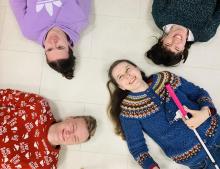
P4 Skilled and socially inclusive region
4.1. More people benefiting from stronger Central Baltic communities
Southern Finland - Estonia
01.09.2020 - 31.08.2022
252.038 EUR
198.650 EUR ERDF
Visually impaired young people are invisible to society and live a secluded life. Their education level is lower and unemployment rates higher. They live with their parents even at the adult age of 18-25 years and older. They are clearly isolated from the rest of society and their peers, yet their needs and requests for services are unknown both in Estonia and Finland. The aim of this project is to find new ways for working with young people with visual impairment to improve their feeling of coping and life management. Through these changes we hope to promote independent living, studying, working and overall inclusion. To develop efficient ways of reaching these goals, we need to compare the situation in both countries and to find models for reaching visually impaired young people.
Both in Estonia and in Finland, the situation of the visually impaired young people is highly polarized: while the majority of the young people with visual impairment are struggling there is a minority that is doing exceptionally well. With the help of this minority, we aim to find out what obstacles visually impaired young people are facing that complicate studying and working and to look into the factors that make moving out and independent living challenging. We will then look for ways to overcoming these obstacles. One known factor are parents that can be overprotective.
To reach the actual goal of this project, we will organize workshops for the target group and their parents. These workshops will consist of peer support groups and guidance by professionals and mentors, aiming to offer concrete help and solutions to the problems that cause isolation. The experience and ideas we gain from these workshops will further help us to offer better services for the visually impaired youth in both countries.
Country: FI
Partner budget: 155.825 EUR
Amount of ERDF funding: 116.868 EUR ERDF
Country: EE
Partner budget: 96.213 EUR
Amount of ERDF funding: 81.781 EUR ERDF
MOL project promoted the social inclusion of the visually impaired young people aged 18-25 in both Finland and Estonia. This project focused on increasing independence and empowerment of the target group in both countries by promoting their potential to study, work and live independently.
The project developed a new model for rehabilitation and services for the target group. Basis for the new model was created through pilots which were implemented for the target groups with a strong support from peers. The project involved 14 visually impaired young people to their workshops. During the workshops peer support and encouragement from peers was one of the most valued elements of the workshops. Participation in the workshops had a positive impact on young people behaviour and self-impression. They clearly got empowered and felt more confident to take part in new tasks.
The project experiences including the model for rehabilitation and services for the visually impaired young people is collected in guidebooks – “Näkövammaiset nuoret aktiivisina toimijoina” and “Minu enda elu”. The guides offer support and concrete advice for the visually impaired young people themselves, but also to those people that are part of their lives, for example parents, teachers or rehabilitation workers.
Näkövammaiset nuoret aktiivisina toimijoina: https://www.nkl.fi/fi/esitteet-ja-oppaat
Minu enda elu: https://pimedateliit.ee/projekt-minu-enda-elu/
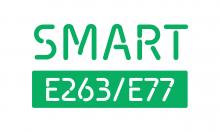
P3 Well-connected region
3.1. Improved transport flows of people and goods
Central Baltic
01.06.2020 - 30.11.2022
2.597.243 EUR
2.103.767 EUR ERDF
The E263 (2) and E77(A2) are connecting roads to the Russian border and Pskov (RU) and both have 2+2 motorway sections with very high traffic density near Tallinn and Riga. They are one of most intensively used road sections connecting ports, logistic centres and they connect capitals with Eastern regions. The growing transit truck traffic is seen as a critical player in traffic safety, more truck drivers from the Southern part of Europa are involved with minimal experience of winter driving causing an increasing number of traffic accidents. Smart traffic management solutions create new possibilities to communicate with roadusers to warn them about severe weather risks and to inform them on safe winter driving.
The project "SMART E263/E77" will implement smart dynamic traffic management solutions in close cooperation between Estonian and Latvian national road operators by sharing knowledge and developing new joint approaches. The cooperation with the national traffic management centres will enable pro-active cross-border traffic management.
The Estonian, E263 Tallinn-Tartu-Võru-Luhamaa road will have smart dynamic speed management (up to 110 km/h) in Tallinn-Kose 2+2 section km 6-40 and E263 section between Mäo and Luhamaa will be equipped with warning VMS signs to insure in-site critical road information delivery. In LV, E77 (A2) Riga-Pihkva road 2+2 motorway section from A4 junction to A3 (30 km section) will be equipped with dynamic speed management (up to 110 km/h). The E77 section between the A3 junction to the Estonian border will be equipped with warning VMS signs to assure in-site critical road information delivery.
It is estimated that all measures taken in Estonia and Latvia will save about 2,46 minutes of travel time per vehicle (0,88% up to 5,6% on 2+2 sectons) and will increase traffic safety in Tallinn-Tartu-Riga transport corridor.
Country: EE
Partner budget: 1.338.243 EUR
Amount of ERDF funding: 1.083.977 EUR ERDF
Country: LV
Partner budget: 1.259.000 EUR
Amount of ERDF funding: 1.019.790 EUR ERDF
The main objectives of the project were to improve traffic flow, to increase traffic safety and to save travel time on the E263/E77 transport corridor from Tallinn via Tartu and Luhamaa in Estonia to Riga in Latvia by implementing smart dynamic traffic management solutions.
Project modernised traffic management services along the route by installing adaptive traffic lights, variable message signs, road weather stations, traffic cameras, etc. All these tools are integrated in one traffic management system monitored and operated by Traffic Management Centers allowing timely warning about situations on road and weather responsive traffic management, including dynamic cross border traffic management.
As a result of implemented tools on the E263 and E77 road, the travel time will be saved by 2,46 minutes per vehicle (0,88% up to 5,6% on 2+2 road sections). It also has a positive effect on reducing CO2 emissions.
Important impact of implemented measures is the increased overall traffic safety in Tallinn-Tartu-Võru-Luhama-Riga transport corridor.
Tallinna-Tartu maanteele lisandub veelgi tarka tehnoloogiat (Järva Teataja 2020)

P1 Competitive economy
1.1. New Central Baltic knowledge intensive companies
Central Baltic
01.02.2020 - 31.08.2022
797.219 EUR
617.945 EUR ERDF
New, innovative and growth-oriented startups are essential for the economic growth and competitiveness of the Central Baltic area. The NBS project creates and strengthens regional collaboration by creating a globally competitive knowledge-intensive hub for new jobs and businesses. Stemmed from the previous Central Baltic project Springboard, the accelerator periods are longer since more intensive and long-lasting cooperation between the teams is needed to gain the startup readiness and engagement to work cross-border.
The project impact is based on a logic of early intervention when forming new cross-border startups. The project aims to form cross-border teams rather than mixing already existing teams. The other crucial work package for achieving successful joint ventures is to coach the new enterprises investment readiness and to bring startups, customers and investors together.
To achieve these goals, the project provides its target group (new startups, PhD and degree students, researchers, recent graduates and highly educated expats) a smooth and supported path towards entrepreneurship and at the same time it supports the already existing pre-seed stage startups to find their first customers and investors/advisors. The consortium consists of partners from Estonia, Finland and Sweden who will implement two joint business acceleration programs, coaching and mentoring, targeted matchmaking and investor activities for already established early-stage companies.
Country: FI
Partner budget: 458.755 EUR
Amount of ERDF funding: 344.066 EUR ERDF
Country: SE
Partner budget: 138.164 EUR
Amount of ERDF funding: 103.623 EUR ERDF
Country: EE
Partner budget: 200.300 EUR
Amount of ERDF funding: 170.255 EUR ERDF
The aim of the project was to increase the capacity of Central Baltic region to produce international start-ups by supporting teams and new enterprises. In different project events 63 new enterprises were supported. Accelerator programme was completed by 15 startups and 10 startups graduated from Investment Readiness process.
Because of the Covid-19 pandemic and related travel restrictions project developed digital tools and it gave possibility for more people/entrepreneurs to participate in the project events online. There were hundreds of participants in Hackathons, Matchmaking and Networking events and over 100 investors took part in trainings and project events. On the negative side it made impossible to have direct face-to-face events and it didn’t support development of joint cross-border ventures.
The structured Investment Readiness Process developed and launched during the NBS project will be integrated to partners’ services, as well as other Investor Services.
Startup-yritysten palvelut täydentyvät (Turun Sanomat, 2020)
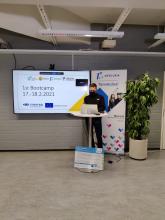
P1 Competitive economy
1.2. More entrepreneunial youth
Central Baltic
01.06.2020 - 31.05.2022
488.472 EUR
400.446 EUR ERDF
Cross-border relationships, entail the ability to communicate and negotiate ideas and to make deals with people from other countries and cultures.Relationships with neighbouring countries are extremely important to boost the regional export ability and to enter new markets in any field; globalisation and internationalisation of companies (including student companies) in the Central Baltic region are an issue that needs to be addressed and promoted in order to raise the number of new exportable products and competitive businesses both now and in future.
The “Teaming UP” project promotes confidence and business skills boosting in youngsters who are interested in business and who possess entrepreneurial skills and business thinking. The project will foster a global approach to support participants in developing international business teams and ideas. Project activities, outputs and results are based on the creation, development and implementation of international business teams and business projects.
The teams will bring together young people from different countries, each offering their own unique, personal and professional contributions to the business team.
Country: LV
Partner budget: 125.072 EUR
Amount of ERDF funding: 106.311 EUR ERDF
Country: EE
Partner budget: 115.713 EUR
Amount of ERDF funding: 98.356 EUR ERDF
Country: FI
Partner budget: 234.735 EUR
Amount of ERDF funding: 176.051 EUR ERDF
Country: LV
Partner budget: 90.639 EUR
Amount of ERDF funding: 77.043 EUR ERDF
The project has developed a Teaming up motivational programme methodology which has included a large number of different kinds of events, workshops, entrepreneur visits, mentoring and a bootcamp as well as pitching possibilities. Altogether 12 international business teams were formed as a result of the project. Ten mentors from Latvia, Estonia and Finland were involved and more than 50 business experts and speakers from the Central Baltic region took part in the project.
Cross-border cooperation was also the main driving factor that improved students' business skills and entrepreneurial potential. It encouraged them to think globally and internationally In the future, it will support them to enter new markets, export their product and communicate their ideas with people from different countries.
An additional result of the Teaming UP programme is the availability of student company products in the Mercuria online store, thus encouraging students to continue developing their business ideas after the programme (https://shop.mercuria.fi/c/tuotteet/teaming-up-products).
A project sustainability plan has also been made.
Lead partner webpage - project link
Pandeemia ei sega rahvusvaheliste õpilasfirmade loomist (opleht.ee, 05.03.2021.)
Unikalitāte, aizrautība un motivācija biznesā (developvalmiera.lv; 30.03.2021.)
VINKKEJÄ YRITYKSEN PERUSTAMISEEN TEAMING UP-PROJEKTIN MENTOREILTA (mercuria.fi; 22.05.2021.)

P2 Sustainable use of common resources
2.1. Natural and cultural resources developed into sustainable tourist attractions
Central Baltic
01.06.2020 - 31.12.2022
1.132.638 EUR
917.249 EUR ERDF
There is a clear market demand for attractive tourism destinations that can respond to the latest travel trends: authentic lifestyle and sustainability. This provides the Central Baltic region with the opportunity to develop its rural tourism potential. The region can count on several traditional activities related to authentic rural lifestyle. These activities have the potential to attract tourists by offering them the opportunity to immerse themselves into the local everyday life. These activities entail voluntary work camps, hands-on handicraft and cooking workshops, farming, berry and mushroom picking, fishing, home visits, pop-up cafes and other cultural events.
To better market this regional potential, a cluster of Rural Lifestyle (RL) destinations (Söderhamn, Sweden; Aland & Lohja, Finland; Estonia; Latvia) will be established. The cluster will attract travel agencies and tourists from Asia and Europe to enable local tour operators to approach their overseas counterparts with variety of activities and tour packages.
The network of “RL Destinations" established by the project will be enabled and further expanded during and after the project lifecycle.
Country: EE
Partner budget: 261.770 EUR
Amount of ERDF funding: 222.505 EUR ERDF
Country: FI
Partner budget: 129.455 EUR
Amount of ERDF funding: 97.091 EUR ERDF
Country: FI
Partner budget: 114.339 EUR
Amount of ERDF funding: 85.754 EUR ERDF
Country: FI
Partner budget: 103.163 EUR
Amount of ERDF funding: 77.372 EUR ERDF
Country: SE
Partner budget: 107.977 EUR
Amount of ERDF funding: 80.982 EUR ERDF
Country: EE
Partner budget: 130.260 EUR
Amount of ERDF funding: 110.721 EUR ERDF
Country: LV
Partner budget: 80.507 EUR
Amount of ERDF funding: 68.431 EUR ERDF
Country: LV
Partner budget: 205.167 EUR
Amount of ERDF funding: 174.392 EUR ERDF
New attractive and sustainable Rural Lifestyle tourism product was developed – destinations around the Baltic Sea (Estonia – Setomaa historic region, Vana-Võromaa historic region, Mulgimaa historic region, Onion Route – the shores of Lake Peipsi, Soomaa National Park, Lahemaa National Park; Latvia – Abava river valley, Sēlija, North Vidzeme, Gauja National Park; Sweden – Söderhamn; Finland –Åland, Archipelago of Kökar in Åland, Brändö island in Åland, Lappo island in Åland, Jurmo island in Åland, Lohja), altogether 39 new products. The project partnership developed a joint Rural Lifestyle destination and a new brand GORURAL which is very attractive in foreign and domestic tourism markets. First 39 RL products and more than six smaller destinations are promoted via the RL website, printed and digital marketing materials.
Regarding the increase in the number of visitors, the target value was 3000 visitors. Due to the different sizes of the regions and other conditions, each pilot region analysed the increased number of visitors as a result of the project according to its own methodology. The project reached and exceeded the set target value with 6555 new RL foreign visitors, and added 83850 domestic visitors.
Facebook @RuralLifestyleproject
Project partner webpage (celotajs.lv - description, news, publicity)